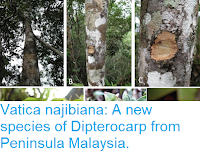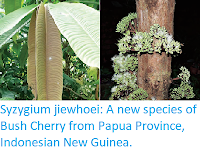Figs, Ficus spp., are flowering trees, shrubs, vines, and occassionally epiphytes found throughout the tropics and to a lesser extent in warm temperate zones. Most species produce edible fruit, though only one, the Edible Fig, Ficus carica, is widely cultivated, with most others considered somewhat unpalatable by Humans, though they are an impotant food source for a very wide range of animals. Figs have a unique relationship with Fig Wasps, Agoanidae, with the Wasps fertilizing flowers within the fruits of the Plants, where they also lay their eggs, the growing fruit providing both food and a home to the Wasp larvae, which carry pollen to new Plants when they mature.
In a paper published in the journal Blumea on 10 May 2019, Bhanumas Chantarasuwan of the Thailand Natural History Museum, Sarawood Sungkaew of the Department of Forest Biology and the Center for Advanced Studies in Tropical Natural Resources at Kasetsart University, Kanchana Pruesapan, of the Plant Varieties Protection Division at the Department of Agriculture, Pieter Baas of the Naturalis Biodiversity Center, and Peter van Welzen, also of the Naturalis Biodiversity Center, and of the Institute of Biology Leiden at Leiden University, describe a new species of Fig from Thailand.
The new species is named Ficus pongumphaii, in honour of the Thai dendrologist, Somnuek Pongumphai. The species was first identified from a specimen found growing in a limestone crack on a hillside in Lop Buri Province, and subsequently found on limestone hillsides in Chiang Mai, Lop Buri and Saraburi provinces. The species forms shrubs reaching about 3 m in height, with distinctive brown hairs on its leaf shoots.
See also...
The new species is named Ficus pongumphaii, in honour of the Thai dendrologist, Somnuek Pongumphai. The species was first identified from a specimen found growing in a limestone crack on a hillside in Lop Buri Province, and subsequently found on limestone hillsides in Chiang Mai, Lop Buri and Saraburi provinces. The species forms shrubs reaching about 3 m in height, with distinctive brown hairs on its leaf shoots.
Photos of live Ficus pongumphaii. (a) Habit in natural habitat; (b)–(d) twigs with leaves and Figs; (e). Fig; (f) Fig in longitudinal section. Chantarasuwan et al. (2019).
See also...
Follow Sciency Thoughts on Facebook.







